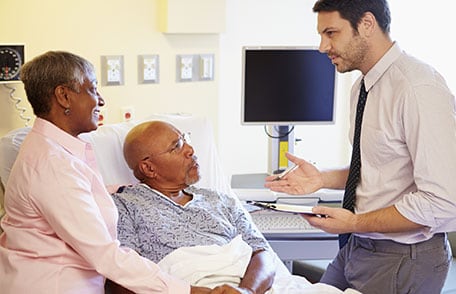
March 22nd is National Lynch Syndrome Awareness Day!

Lynch syndrome is an inherited genetic condition that makes you more likely to get colorectal (colon) and other types of cancer. If you have Lynch syndrome, you can take steps to reduce your chances of getting cancer or find cancer early. To find out if you have Lynch syndrome, collect your family health history, share it with your doctor and have any screenings your doctor recommends. If you have Lynch syndrome, be sure to tell your family members.
What is Lynch Syndrome?
Lynch syndrome is a hereditary cancer syndrome, meaning that it is caused by inherited genetic changes, or mutations. If you have Lynch syndrome, your parents, children, sisters, and brothers have a 50% (1 in 2) chance of having the condition. People with Lynch syndrome are much more likely to develop colorectal and endometrial (uterine) cancer, especially at a young age (before 50). Dave has Lynch syndrome and had colorectal cancer at 28. Amy found out she has Lynch syndrome when she was diagnosed with colorectal cancer days after turning 47.
Why is it Important to Know if You Have Lynch Syndrome?
If you or your family members have Lynch syndrome, your doctor can help you take steps to reduce your chance of getting cancer or find cancer early if you get it. Your doctor may recommend the following:
- Starting screening at a younger age
- Getting screened more frequently
- Using colonoscopy only instead of other tests
After Dave’s son, Zach, tested positive for Lynch syndrome, he underwent a colonoscopy. Knowing his grandfather, father, and uncle all had colorectal cancer, Zach explained, “I had to deal with this, had to get tested and start taking cautionary steps to help prevent any cancer in the future.”
How Do You Know if You Have Lynch Syndrome?
If you have not had cancer, the first step is to collect your family health history and share it with your doctor. Include your close relatives: parents, brothers, sisters, children, grandparents, aunts, uncles, nieces, and nephews. List any cancers that each relative has had and the age at which they were diagnosed. Be sure to ask your relatives if they were ever tested for Lynch syndrome. If your family member has Lynch syndrome, you should be tested for the same mutation they have.
If you have already had colorectal or endometrial cancer, your tumor tissue may have been checked for Lynch syndrome. However, in some cases, additional testing may be needed to know for sure if you have Lynch syndrome. Your doctor may recommend genetic counseling and testing if you
- Were diagnosed with colorectal cancer;
- Were diagnosed with endometrial cancer (especially before 50);
- Have several family members with cancers associated with Lynch syndrome; or
- Have a family member with Lynch syndrome.
If genetic testing shows you have Lynch syndrome, talk to your doctor about how you can reduce your chances of getting cancer in the future. Having Lynch syndrome increases your chances of getting other cancers besides colorectal and endometrial cancer, including ovarian, stomach, liver, kidney, brain, and skin cancer.
Be sure to let your family members know about your Lynch syndrome diagnosis so they can be tested for your mutation. Dave advises, “Whenever there is a family get-together, make it a priority to have that conversation, have your material ready, and don’t let it go because you’re talking about real issues. You’ve got to be persistent.”
Visit the websites below to find more information on colorectal cancer, Lynch syndrome, cancer genetic testing, and genetic counseling services.
More Information
- Colorectal Cancer, Centers for Disease Control and Prevention
- Lynch Syndrome, Genetics Home Reference, U.S. National Library of Medicine
- Cancer Genetic Services Directory, National Cancer Institute
- Find-A-Counselor, National Society of Genetic Counselors
- Have You or a Family Member Had Colorectal (Colon) Cancer?























.png)









No hay comentarios:
Publicar un comentario